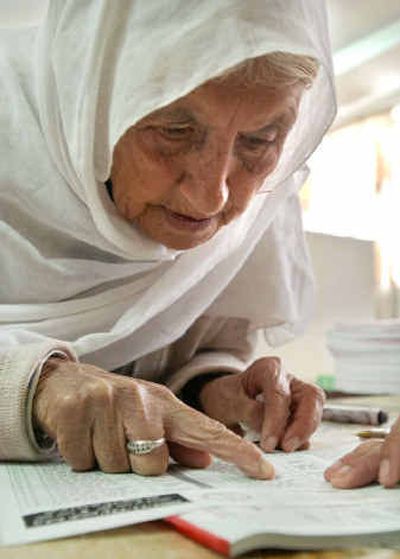Palestinians vote in local elections

DAHARIA, West Bank – The sun slipped behind the rolling hills, and the temperature went down with it, but the line of would-be voters outside the Daharia Girls School on Thursday wasn’t getting any shorter.
A few expressed their impatience by pounding on the school’s steel doors, a few more by yelling at anyone who dared peek out from inside. But most simply waited in the gathering darkness for their turn to cast a ballot in the first Palestinian municipal elections in nearly 30 years.
“There are no problems here,” said Shafik Kesiye, 48, a polling-place observer representing the Fatah movement, the Palestinian Authority’s dominant party. “Everyone is voting freely. Maybe there are some administrative problems, but it’s democracy.”
In this town of 30,000 at the southern end of the West Bank, and in more than two dozen other small communities, Palestinians kicked off what is scheduled to be a lengthy election season, with a presidential ballot set for Jan. 9 and legislative elections and more municipal votes due over the course of the coming year.
Elections for local councils were last held in 1976, and the winners have mostly retired or been forced from office over the intervening years, replaced by Fatah appointees whom many Palestinians regard as ineffective or corrupt. Though scheduled before Arafat’s death, the new elections come just weeks before the vote to choose his successor and at a time when Israel is pushing forward with plans to evacuate the Palestinian-populated Gaza Strip. President Bush, British Prime Minister Tony Blair and other world leaders have identified this confluence of events as an opportunity for Palestinians to demonstrate their commitment to democracy.
Thursday’s balloting pitted Fatah, the movement founded by Yasser Arafat, against the Islamic Resistance Movement, or Hamas, for the first time. Several other factions also participated, and analysts said the outcome was likely to vary from town to town. Votes were still being counted late Thursday night, and official results were not scheduled to be announced until Saturday.
Hamas, which rejected the 1993 Oslo peace accords with Israel and the system of limited Palestinian self-rule that it created, boycotted the Palestinians’ last general election in 1996 and has vowed to do the same during the coming presidential campaign. But in Thursday’s contest for town council seats in 26 West Bank towns and villages, candidates who openly identified themselves with Hamas ran on the slates of several self-styled Islamic parties.
In Abu Dis, a village on Jerusalem’s eastern edge, Abdul-Basit Razem, an official of the local Hamas-aligned group, the Islamic Reform Bloc, stood outside his party’s headquarters and gestured at the swarms of people in a busy intersection, chatting and debating in an animated way.
“Now, it is a festival for us to have these elections,” said Razem, 36. “We are in a party now – the Islamists and the others.”
After the euphoria of the elections wears off, however, the reality facing the winners will be sobering, said Salah Ayyad, a candidate from the town’s third major party, the Democratic Front for the Liberation of Palestine. “Responsibility will be high for anyone elected here,” he said, adding that years of Israeli occupation, settlement building and security measures had sapped Abu Dis of land, clean water and immediate access to health care.
“Abu Dis is a center of the West Bank, a center of transportation between north and south,” he added. “There is talk about making Abu Dis the capital of a Palestinian state. … To be in charge in Abu Dis will not be a simple or easy job.”
In Daharia, a town tucked in among terraced farms and forested hills about 25 miles south of Jerusalem, the campaign left many voters more bitter than optimistic. Four candidates on the local Hamas-aligned slate were arrested two weeks ago and remain in jail, prompting complaints from supporters of the Islamic party that their chances at victory had been undercut.